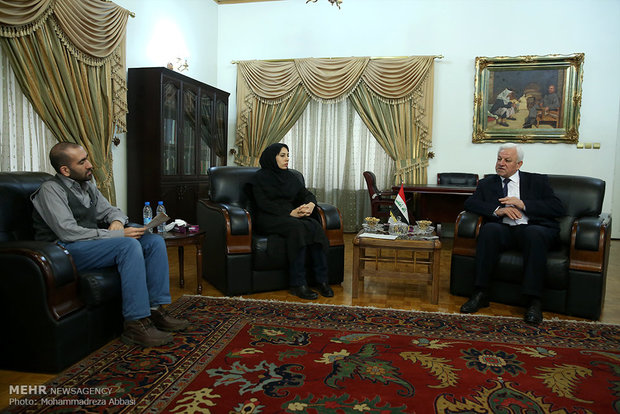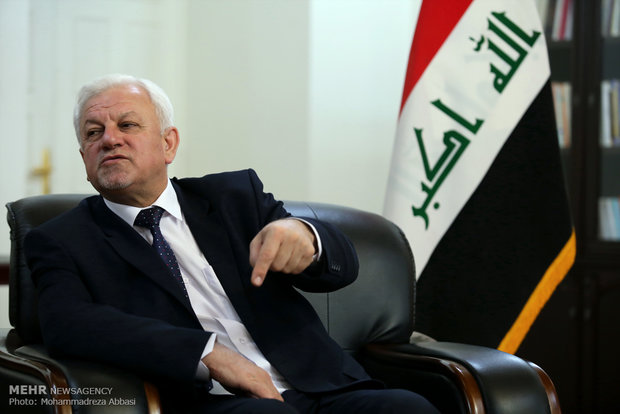Somayeh Khomarbaghi and Mohammad Mazhari of Mehr News International service had an interview with Iraqi ambassador to Tehran Mr. Rajih Sabir Aboudi al-Mousavi in his embassy office earlier in December. Mr. al-Mousavi believed that all foreign forces working with Iraqi government had been there with official request by Iraqi government and Turkey’s military trespassing of the Iraqi borders in the north was to be internationally condemned as violation of international borders. However, Mr. Ambassador believed that Turkey was still a Muslim country and a friend which should take the example of Iran whom al-Mousavi hailed for supporting Iraq through sending consulting officials in fight against terrorism.
The interview covered wide range of issues, inter alia, and the most important perhaps, Russian involvement in fight against ISIL both in Syria and formation of a four-sided ‘Intelligence Center’ along with Syria, Russsia and Iran:
How would you interpret Turkish forces coming to Mosul crossing the border, while Ankara has claimed that its forces only crossed the borders by a permission from Baghdad? Is Turkey honest in its claim?
As you know, the region is witnessing terrible and unfortunate days and countries experience disturbing events in security, political, and economic levels; however, we see a systematic failure and a realistic view of the situation by the international community; we are also a member to this community and are no exception to these influences. It is hapless that conflict has escalated between Iraq and Turkey who otherwise are Muslim neighbors.

When we speak of relations with Iran, a sense of euphoria infuses us, since Iranians had never trespass our borders, rather, they have sent military consultants to help Baghdad in fighting terrorism. We want to see Turkey also doing such things, taking the example of Iran, and have strong relations to Iran, Iraq, and the region at large. Our interests are closely interrelated by the virtue of being located in a single region. Hence, developments in our neighbors definitely spread to our country. 5 years after the dawn of war in Syria, now the international community have grappled with idea of forging a coalition against ISIL, Al-Qaeda and other terrorists, while Iran and Iraq had been warning since the beginning of the crisis that the danger would spread to all countries.
With Iraqi forces performing highly against ISIL in retaking larger parts of territories in Diyala, Tikrit, and Al-Anbar, Turkey has violated international laws in respecting international borders and trespassed Iraqi soil from the north, under mere absurd pretexts, while claiming that Baghdad agreed to the border crossing. However, their claim is baseless and Iraq will never tolerate ground forces from other countries violating its borders. We do not need new crisis. We condemn Turkey’s action and have sent the UN messages to mount pressure on Turkey to pull out of north of Iraq. The action is provocative and we hope Ankara will act wisely, otherwise we will use our right by international instruments.
Would you predict further escalation of conflict and military engagement by both sides and an incipient war?
We hope not. Iraqi government and nation would not welcome further escalation, since we are now focused on ISIL, a threat also for Turkey with whom the country claims to fight.

An ‘Intelligence Center,’ by Iran, Russia, Iraq, and Syria as members, has been established in Baghdad. Would the Center be extended the level of cooperation in the future, and would Baghdad file a request for Moscow to engage in fight against Iraqi side of the ISIL as well?
The Center acts as ‘operation chamber;’ with fruitful Russian involvement in Syrian setting, strategic changes had been introduced to the way the ISIL is fought back; we believe that some great powers actually back terrorists in Syria and Iraq, however, Russia positively changed the equation on the ground. The Center is crucial to bring coordination to four members. Iran’s position has been clear since beginning of the crisis in the region urging establishment of an honest international coalition to fight against terrorism. What Iran has opposed in last two years, has been a hypocritical coalition.
This is our right to call our friends to join fight against terrorism which is a threat to all countries, and hence we welcomed this Center.
What has been the role of People’s Mobilization or al-Hashd al-Shaabi as it is called, in fight against Takfirists, especially with recent fall of some of ISIL’s stronghold cities?
People’s Mobilization is the backbone of Iraqi forces and represents all Iraqi ethnic and religious groups such as Sunnis, Shias, Christians and Kurds. They are actually reserved forces, and classified as ‘security forces.’ Mobilization has now succeeded in reclaim larger parts of Iraqi soil from under the ISIL and other terrorist rule. Its role and function is therefore indispensable in Iraqi setting.
Some criticism are leveled against formation of Iraqi National Guard. Opponents believe the formation will weaken the classical army of Iraq and will precipitate Iraqi disintegration. What do you think of it?
Now, we see in TV channels broadcasting inside Iraq hold different opinions and positions. We may call these opinions well in line with Iraqi expediencies. Criticisms are natural part of this process. About the regional quotas in the National Guard, we believe that population is not the true and accurate measure to determine its quota of forces participating and being recruited in the National Guard framework. We believe also that the level of engagement in fights against ISIL does constitute a measure of the quota of cities. For example, Mosul is a large city with more population. In comparison, Basra, Samawah, and other cities have smaller number of population. But, people in these smaller cities have been unswerving in their loyal participation in the fight against terrorism, and in Mosul, people did not show that level of enthusiasm and interest. This is the point in the quota in recruitments.
Despite all this, I believe Iraq is strong and will protect its national unity. This is rare across the world.
Interview by: Somayeh Khomarbaghi and Mohammad Mazhari
End of Part One

























Your Comment